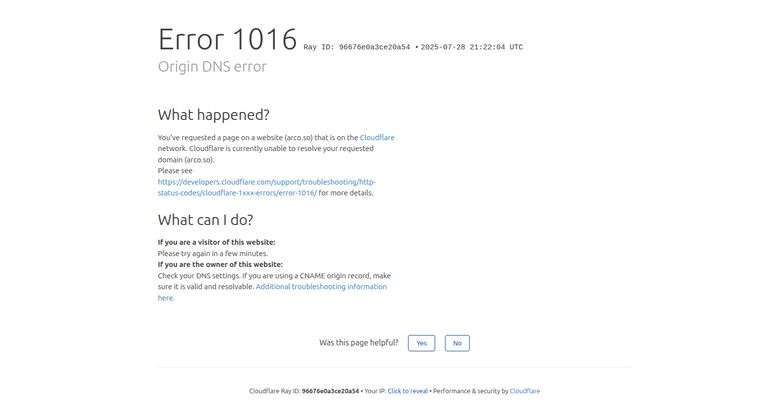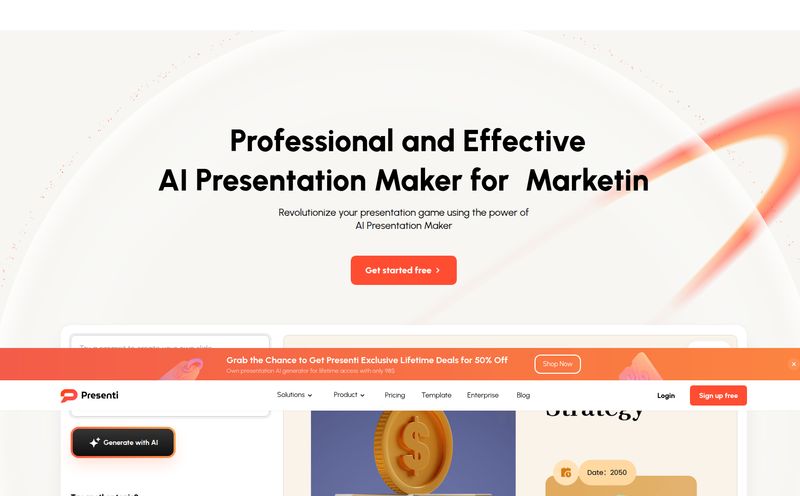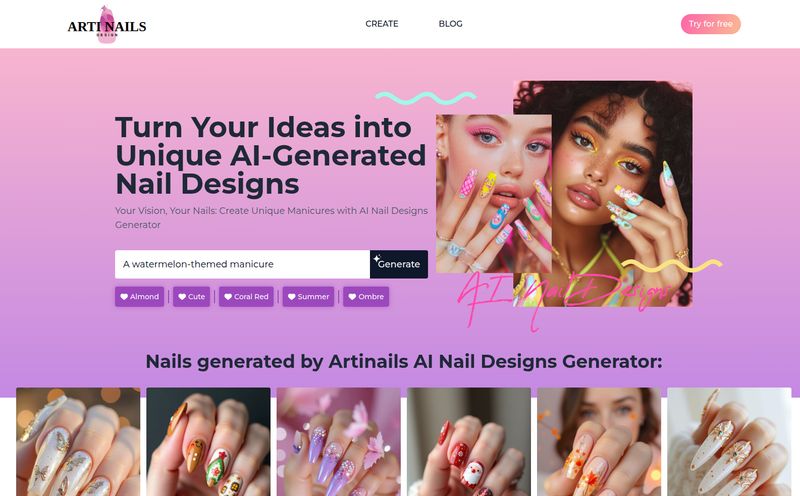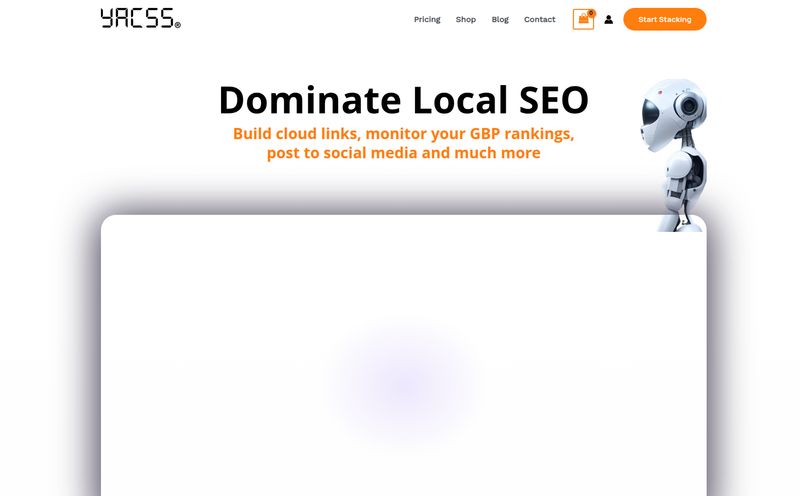As someone who's spent years neck-deep in the trenches of SEO and traffic generation, my radar is always twitching. I’m always on the lookout for the next big thing. The tool that promises to make our lives as creators, marketers, and digital nomads just a little bit easier. So, when I stumbled upon a new player called Arco, my interest was definitely piqued.
The pitch? An AI-powered content hub that transforms your boring old "link in bio" into a dynamic, interactive portfolio. It sounded like it was designed to finally solve that drab, static list of links we're all so tired of. Think less of a digital business card and more of a personal, interactive micro-museum. The promise was huge. But as with all things that sound too good to be true, there's a bit of a story here.
So, What Exactly is Arco Supposed to Be?
Let's talk about the concept, because frankly, it's a good one. For years, we've relied on services like Linktree or Beacons to corral all our scattered digital breadcrumbs—our latest blog post, our TikTok, our shop, our YouTube channel. It works, sure. But is it inspiring? Not really. It’s functional, like a rolodex. But who gets excited about a rolodex?
Arco's vision is to be a true Linktree alternative by injecting a heavy dose of AI into the mix. Instead of a static list, Arco claims it builds you a gorgeous, immersive page. It’s an AI portfolio builder that pulls in your content and presents it with animated flourishes, smart layouts, and a vibe that’s supposed to match your personal brand. The goal is to stop just directing traffic and start creating an experience. And in our game, experience is everything because experience leads to engagement, and engagement leads to conversions.
The Promised Land of Features
Diving into their proposed features got me even more interested. It wasn't just about looking pretty; it was about creating a living, breathing hub for your content.
AI-Powered Page Design
The core promise is that you don't need to be a designer to have a beautiful page. Arco's AI is meant to analyze your content—your images, your links, your socials—and then design a layout around it. It talks about creating “visually stunning pages” without you having to touch a single line of CSS or get lost in a clunky drag-and-drop editor. For the creatively-minded but technically-challenged creator (and there are many), this is a massive selling point.
Making Your Content Come Alive
This is where it gets really cool. Arco was boasting about features like animated avatars and “living covers.” Imagine your profile picture subtly moving or the header of your page having a gentle, dynamic quality. It also promised seamless integration of your social feeds, music from Spotify, and videos from YouTube or TikTok, all presented within these AI-curated layouts. This turns a passive page into an active one, increasing the chances that a visitor will stick around, explore, and actually click on something.
It’s a smart move. We all know that boosting user engagement on-site is a huge signal to search engines and a boon for any brand. An interactive page inherently keeps people interested for longer than a simple list of links.
The Big 'But'... Where Did Arco Go?
So, here I am, all excited to take this thing for a spin. I've got my links ready, I'm envisioning my new animated bio page, I navigate to their website (arco.so)... and I hit a wall. A big, white, technical wall.

Visit Arco
An "Error 1016: Origin DNS error."
For those not fluent in server-speak, this is basically the internet's version of a disconnected phone line. The domain name (arco.so) is live, but it’s not properly connected to the server where the website actually lives. It's the digital equivalent of a shiny new storefront with a sign that says 'Opening Soon!' but the doors are locked and no one's inside. I checked again. And again. Same error.
This adds a strange, almost mysterious layer to the whole thing. Is this a temporary hiccup for a new startup? Did they launch their marketing before the tech was fully baked? It’s a bit of a fumble, to be honest, but it also makes me even more curious. Startups are messy, and sometimes things break. The real test is how and when they fix it.
The Good, The Bad, and The Theoretical
Since I couldn't actually use the tool, let's analyze its potential based on the promises. If and when Arco gets its DNS sorted, what can we expect?
The Potential Upside
The biggest pro is the effortless sophistication. Creators are often spinning a dozen plates at once. Acting as a content creator, marketer, editor, and web designer is exhausting. A tool that genuinely takes the design work off your plate while producing a high-quality, interactive link in bio page could be a game-changer. It lowers the barrier to entry for having a professional-looking personal hub, which can directly impact brand perception and, down the line, traffic and revenue.
The Potential Downsides
Of course, there are always trade-offs. The reliance on AI for design might feel limiting for seasoned designers or creators with a very specific aesthetic. You might be sacrificing granular control for convenience. There’s also the potential learning curve some AI tools have; sometimes “magic” AI requires a very specific type of input to work well. And the most ironic one, given the current situation, is platform dependency. If you build your entire digital storefront on Arco and it goes down... you're left with an error page. A stark reminder to always have a backup plan.
What's the Price on this AI Magic?
As you might have guessed, there's no public pricing information available right now. With the site being down, the pricing page is also inaccessible. My educated guess? They would likely follow a freemium model, similar to their competitors. A free basic version to get you hooked, with pro tiers that offer more customization, deeper analytics, and premium integrations. I’d expect to see a Pro plan somewhere in the $5-$25 per month range, depending on the features. But for now, that's just speculation from an old industry hand.
Frequently Asked Questions About Arco
- Is Arco a good alternative to Linktree?
- Conceptually, yes. It aims to be more than just a list of links by using AI to create an interactive and visually appealing page. If it delivers on its promises, it could be a very strong alternative. For now, however, Linktree has the advantage of actually being online.
- What does the "Origin DNS Error" mean?
- In simple terms, it's a configuration problem. The website's address isn't pointing correctly to the server that hosts its files. It's a backend issue that the website's owners need to fix.
- Do I need design skills to use Arco?
- No, that's its main selling point. The platform is designed for its AI to handle the design and layout for you, making it accessible for creators who aren't also web designers.
- Is Arco available to use right now?
- As of this writing, no. The website is currently displaying a DNS error, so it's not possible to sign up or use the service. We're all in a holding pattern.
- Can I embed my Spotify or YouTube content in Arco?
- According to its feature list, yes. Arco is supposed to seamlessly integrate various content types, including music and videos, directly onto your page to improve user engagement.
Final Thoughts on This Digital Ghost
So, where does that leave us with Arco? We have a fantastic concept with a ton of potential, followed by a mysterious and slightly concerning technical glitch. It’s like discovering a map to a hidden treasure, only to find the path is currently blocked by a landslide.
I, for one, am not writing it off yet. I'm choosing to be cautiously optimistic. The idea behind this AI content hub is solid, and it taps directly into a need that many creators have. I'll be keeping the tab open, refreshing it every now and then, hoping to see that error page replaced by the revolutionary tool it promises to be.
Here’s hoping they get their DNS woes sorted out soon. I’m still rooting for them, because a more beautiful and interactive web is good for all of us.



